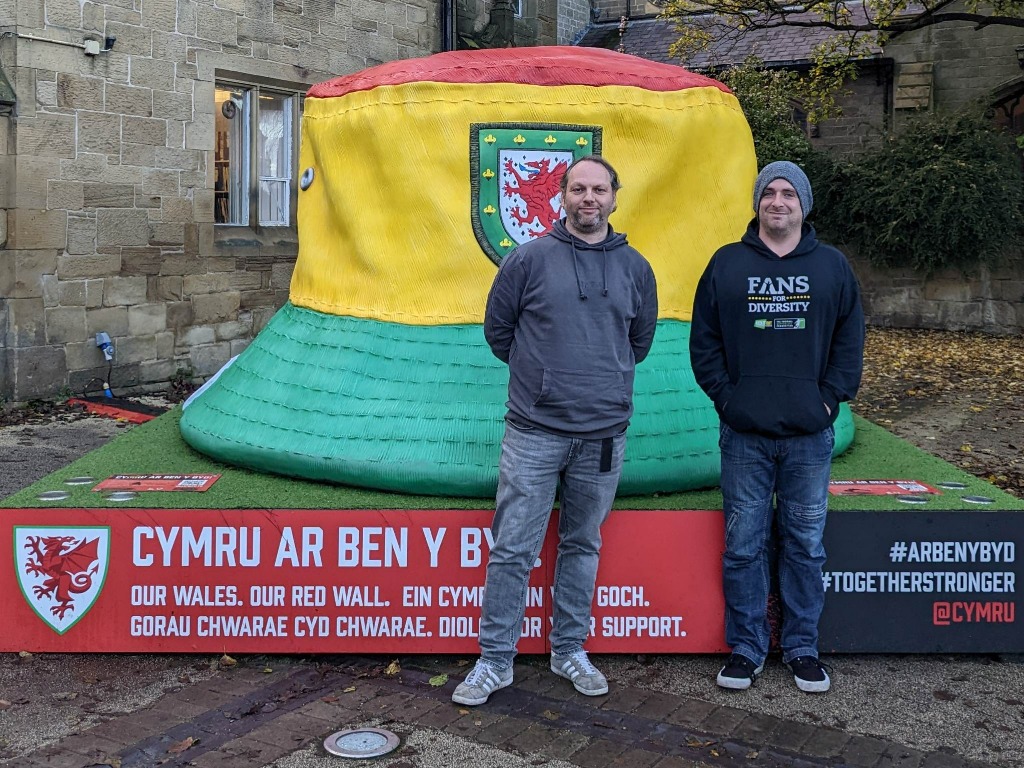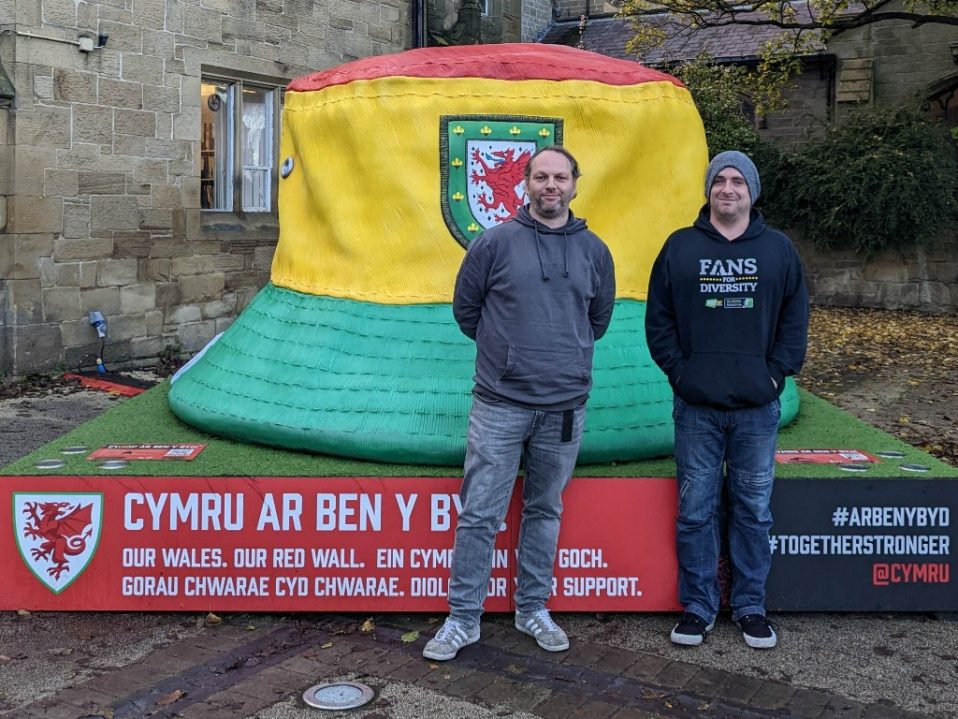As the work to build a new Football Museum for Wales in Wrexham continues to progress, we’re now delighted to be able to introduce you to the two newest members of our team.
Delwyn Derrick and Shôn Lewis have recently been appointed as the new Engagement Officers for the Football Museum Wales project.
Their mission will be to travel across Wales and reach out to football communities, clubs, players, fans and other individuals and groups involved with the game. Through building connections and collecting stories, Shôn and Delwyn’s work will help ensure that the new museum can truly represent Welsh football heritage in all its diversity, from our grass roots clubs, all the way up to the national teams and their historic achievements.
We invited Shon and Delwyn to tell us a little about how they first became engaged with Welsh football, why the new Football Museum project excites their imaginations and which aspect of the engagement work they are looking forward to the most….

Delwyn Derrick
How did you first get interested in football and what are your early memories of watching Welsh football?
“I’ve always enjoyed football but my interest went far beyond just being a hobby back in 2016 when I started my own club here in Wrexham. I have since moved more into the administrative side of football, having a seat on the North East Wales FA and being voted onto the management committee and as chair of the senior football development committee.
“As with most football fans in Wrexham, my first experiences of football were at The Racecourse and it was there that I first saw Wales play in a friendly match against Wrexham in 1998. It was a few years after that when I started discovering grassroots football and I’ve been hooked on the community game ever since.”
Tell us why you think its time Wales had its own football museum…
“I’m excited to see Wales finally have a football museum and I’m thrilled that it’s going to be in Wrexham where the FAW was first founded in 1876. In a sense, the museum being based in the town where the national team started is our own version of football coming home, but it’s also really important that the rest of Wales see it that way and feel part of this journey even if they don’t live in Wrexham.
“For me the Welsh team has always been my second team. When I was younger I supported Wrexham and then Wales. I think that’s what sets us apart from other nations in a way is that the national team is more like our second local team, which is what’s great about a small nation that dreams big and can sing even bigger.
“Our football story is ours and being able to tell the whole of that story in one place, not to the fans, but with the fans, it’s something that we all need.”
What are you looking forward to the most in your new role as engagement officer?
“As an engagement officer, my role is literally going out across Wales, talking to people about a country and a sporting history that I’m passionate about and incredibly proud of. I firmly believe that I have the best job in the world and even in the very short time that I’ve been here, I’ve been able to talk about the museum project and what we are hoping to achieve with some of my childhood heroes like Brian Flynn, Ian Rush and Rob Earnshaw, but I’ve also been meeting some really interesting people in domestic football who’ve told me stories and shown me objects from some of Wales’ history that could have easily been lost.
“Being an engagement officer for a project that is already engaging so many people is amazing and I’m looking forward to digging even deeper and finding people with stories to tell that nobody has told before. What I’m looking forward to the most, is what comes next. Welsh football isn’t done yet and whatever happens tomorrow, the day after it becomes history and part of my job is recording and protecting that for generations to come. It’s a huge responsibility and a dream come true at the same time.”
Shôn Lewis
How did you first get interested in football and what are your early memories of watching Welsh football?
“My earliest memories of football were going to watch a local side called Mountain Rangers, during the mid-80’s they played in the field behind my home in Bontnewydd.
“Even though I was brought up an Everton fan the higher levels of the professional game were a distant, disconnected fantasy to my peers and I, only accessible via television watching the results come in or seeing them compete with Liverpool at the top of Division 1 on the Big Match (well it was the 80’s!) or in Wrexham, Cardiff & Swansea’s case Soccer Sunday on HTV Wales.”
“My first tangible connection with professional football however came in 1991, seeing my dad watching tv where Rush and Southall play together in red and be victorious against Germany.
“From that day to this I haven’t missed a kick on my 31 year journey as my team plumbed the depths of international football and rose to the heights of qualification to Euro 2016, 2020 & Qatar.
“Today I can comfortably say I’m not a fan of any club side, to me international football is the pinnacle of the game and as such anything and everything to do with domestic Welsh football ultimately feeds into it. As I always say, my club is Wales…the only side that I feel truly represents me as a fan, also the only side that can make me feel sick before, during and (if we lose) after a match…but the highs are so, so worth it!”
Tell us why you think its time Wales had its own football museum…
“Wales has a unique footballing history due to its economic, cultural and political structure, football in the north and south developed almost independently of each other and the game here in Wales has a very fragmented history as a result, but it’s a story that needs and deserves to be told.
“To finally be able to give it a ‘home’ in Wrexham where the FAW was founded is amazing not only for the history of the game in Wales but also its future.
“The museum is uniquely placed in this regard, especially today when Welsh football identity has never been stronger, so to have a museum at the ready to document everything as we travel through the most successful period in Welsh football history is vital.
“There are multiple sides to every story and football is no different, hopefully the museum can become a place where all of our stories are kept and made available for future generations to come and see, and perhaps find their own truth about Welsh football and its history.
“Our individual introductions to football, our experiences growing up with it as fans and our reasons for falling in love with the game are all going to be different and are usually tied into our localities and upbringing, and even though I’m only a few weeks in I’ve heard so many amazing stories and viewpoints from people in different parts of Wales that I was previously unaware of.
What are you looking forward to the most in your new role as engagement officer?
“I’m really looking forward to going out into communities throughout Wales, discussing and recording people’s stories about their own local football histories, seeing what’s out there and then bringing it all back into the museum to help make it truly representative of all of Wales, telling our stories as Welsh football fans and our unique footballing culture and history in both our languages.”
If you’d like have any Welsh football stories or items you’d like to bring to our attention, you can get in touch by emailing footballmuseumwales@wrexham.gov.uk
Join the Football Museum Wales mailing list to get news and updates straight to your inbox.

